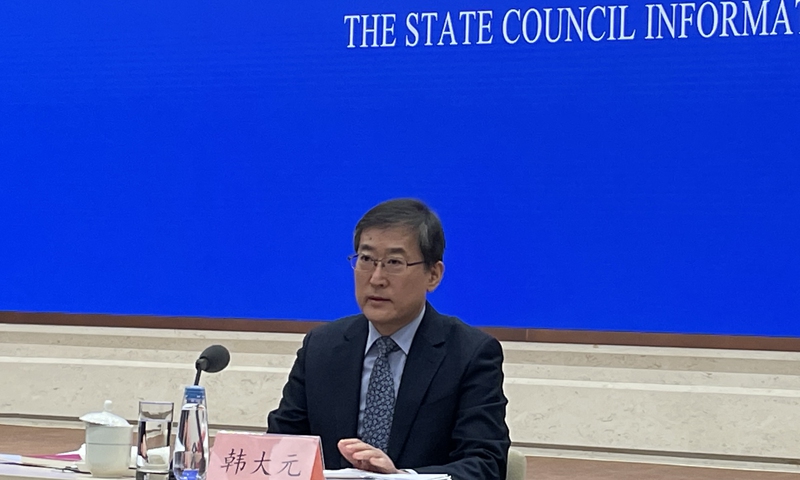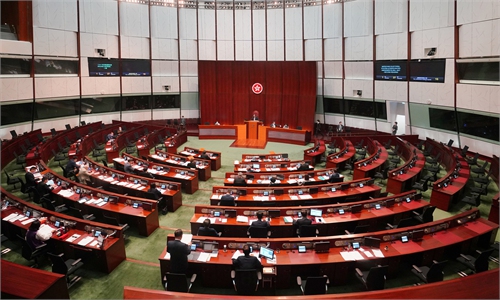Voter turnout not the only gauge for democracy; livelihoods topics in center a highlight of HK elections: experts

Photo:Global Times
Legal experts said voter turnout is not the only gauge for evaluating whether a democracy is successful, and the voter turnout for the recent Hong Kong elections should be viewed systematically and objectively, at a Monday press conference on a recently released white paper about democracy in the Hong Kong Special Administrative Region (HKSAR).
As external voices challenge the "relatively low" voter turnout for Hong Kong's LegCo election, Han Dayuan, a member of Standing Committee of National People Congress' Committee for Hong Kong Basic Law, said the numbers should be viewed systematically, as Hong Kong has elections for LegCo, functional constituency and election committee. Evaluating the overall voter turnout should involve combining all three.
Han said voter turnout is important as it is an indicator of political participation and voters' willingness to participate. But we shouldn't focus only on how many people vote, but also who voted and whether they serve the needs of different social groups, benefit the interests of Hong Kong residents and interests of the city as a whole.
Han also cited international examples to suggest that voter turnout isn't necessarily a deciding factor of democratic efficacy and legitimacy. Equaling the two sets of concepts goes against the principles of democracy and the rule of law.
Globally, local voter turnout fluctuates at about 20 percent in some European cities and the rate for Tokyo was 42 percent, Han said, noting that turnout is decided by the situations of different cities.
The city election voter turnout of New York City was 24 percent; that is, 1.3 million of its 8 million population voted. For Hong Kong, a city of 7 million, a 30 percent turnout represents 1.35 million people, said Wang Zhenmin, Vice President of the Chinese Association of Hong Kong and Macao Studies and a law professor at Tsinghua University.
It is a pattern in the US that local elections have lower voter turnout than federal elections, but polls suggest Americans have trust in their local governments, therefore regional voter turnout doesn't mean low trust in government, Wang said.
Han also attributed the relatively low turnout rate in Hong Kong this year as a result of the public still getting familiar with the new voting rules and procedures, and judging the electoral reform, especially considering that before the electoral reform it was social chaos.
"We should respect voters who want to wait and see, while the system is still in transition," Han said, noting voters' joint will is to improve the governance of Hong Kong. As time goes on, people will have a growing consensus on the new electoral system.
Previously, Hong Kong's elections were overly politicized, lopsided and mostly about political topics. But this time, economic issues and improving local people's livelihoods are the core topics. It takes time for an election culture to move from being mostly about politics to about improving the lives of all local people in different ways, Han said.
He also pointed out that some Western forces and Hong Kong-affiliated anti-China anti-government forces, like wanted suspect Nathan Law, have interfered in the elections, calling on people not to vote. Some so-called poll organizations released negative reports which also affected people's enthusiasm to vote.
The COVID-19 epidemic and corresponding control rules also disrupted communications between candidates and voters, which affected the overall voter turnout, Han said.
However, despite all these challenges, the election was the implementation of a brand new electoral system for Hong Kong, which is in itself a big success, Han said.
Global Times

